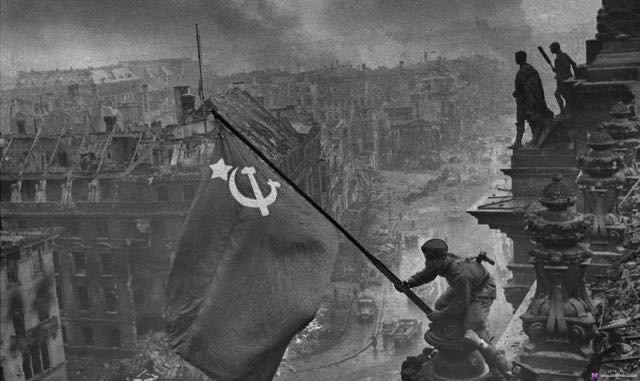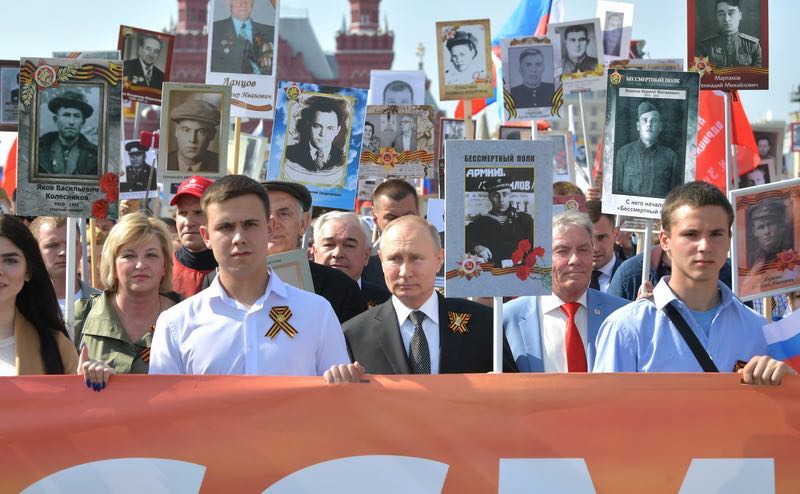What to do with a problem like history? All countries manage their memories for their present convenience, but the escalating furore around the forthcoming 75th anniversary of the end of the Second World War in Europe poses some serious challenges – but also opportunities, argues our columnist Mark Galeotti.
 Russian soldier erects soviet banner on the Reichstag in Berlin at May 2 1945. The iconical picture of Yevgeny Khaldey symbolizes the victory over Nazi-Germany
Russian soldier erects soviet banner on the Reichstag in Berlin at May 2 1945. The iconical picture of Yevgeny Khaldey symbolizes the victory over Nazi-Germany
Of course, Putin’s attempts to capture the narrative of the Second World War essentially as a Soviet victory is often framed in unpleasant and needlessly vainglorious terms. The Soviets ‘liberated’ Central Europe only to impose their own imperial rule on it by bloody suppression and secret police tactics. Nor did they, by any stretch of the imagination, invade eastern Poland to ‘protect’ it from the Nazis.
But few are coming out of the present history wars with much credit. Poland in particular appears hell-bent on pushing an insulting counter-narrative that makes the Soviets as culpable as the Nazis for the war, which is simply not true. The 1939 Molotov-Ribbentrop Pact was no joyful alliance of friends but a cynical deal with the devil. Stalin may have disastrously miscalculated how long it would give him – he was sure he had until 1942 – but he knew war with Hitler was coming. Faced with a West seemingly unwilling to work with him, he hit on this to stave off the inevitable, to give him time to rearm and regroup.
Behind these embittering spats over history, though, are contemporary exercises in seeking to shape the future by reframing the past. Putin needs an unambiguously heroic Great Patriotic War narrative as a cohering national myth, one without strategic blunders and ruthless tyranny, without the NKVD machine-gun teams forcing the penal battalions into the minefields. The truth, of a startlingly effective mobilisation of genuine patriotism, of an almost unparalleled national effort, of the rise of many of the most able generals of the twentieth century, that is apparently not enough.
These spats over history are exercises to shape the future by reframing the past
(Of course, Poland’s ‘first to fight’ narrative is equally disingenuous, and especially a snide dig at the Czechoslovaks’ decision not to resist their dismemberment in 1938-39, arguably doubly problematic given that the Poles themselves took the opportunity to take a bite out of their neighbour.)
Feeling Politics
The facts arguably matter rather less than the feelings: too often analysis of other countries’ politics fails properly to accept the extent to which emotions and consequent subjective understandings have a greater weight than cold calculations and the objective realities on the ground. It is impossible to understand Moscow’s decision to annex Crimea and its refusal to accept Kyiv’s desire for closer alignment with the West without coming to terms with Russian beliefs about their ‘fraternal’ relationship with Ukraine. Likewise, however much one can rationalise the Kremlin’s determination to make this year’s 75th anniversary of the end of the war in Europe a Very Big Thing Indeed in terms of systemic legitimation and narrative control, lurking behind all that is a genuine Russian belief that this was a Very Big Thing Indeed in its own terms.
To challenge that, indeed in effect to tell the Russians that they were to blame for the official figure of 26.6 million (Soviet) war dead, is deliberately to challenge one of their most existential assumptions about themselves. We should not presume that there would not be consequences.
Some of these would be immediate and political, but perhaps of greater long-term significance would be the effect on Russians’ – and especially young Russians’ – perceptions of the West and belief in the possibility for good relations.
The irony is that at a time when the state is doubling down on its toxic misrepresentations of the West, portraying it as simultaneously a cesspool of moral degeneracy and an arrogant and cold-eyed global overlord, and indeed at a time when in the West commentators are getting over-heated about the tone and tenor of Moscow’s propaganda, the Russian people are feeling closer to Europe than ever before.
This is best illustrated through the polling data carried out by Levada, the best and most independent such Russian organisation, that has been usefully collated by Simon Saradzhyan in Russia Matters. In the past four years, the proportion seeing the West as a partner or a friend has risen to 78%, and more Russians see both Europe and the US in positive than negative terms. In a different poll, the share of respondents who agreed with the proposition that 'Russia has enemies' fell in 2019 to the lowest since 2013, before the Crimean annexation and the consequent worsening in geopolitical tensions.
Perhaps the very stridency of TV propagandists reflects not consensus but an uncomfortable awareness that public opinion is flowing away from them – but all they have to offer is more volume?
Bridge Building
Unless, of course, the West gives them more material. The question is how to use this situation to build bridges – or at the very least not burn them.
The Great Patriotic War issue is a visceral one, more than just a response to the Kremlin’s extensive and expensive attempts to mobilise the public (though that hardly hurts). In 2014, when Western leaders boycotted the Victory Day parade in Moscow because of Crimea and the understandable concern that they might find themselves presiding over a march including some of the 'little green men' who had just annexed the peninsula, I personally encountered the anger and disappointment of Russians in the street. They did not understand the niceties of the diplomatic situation, instead with bewilderment and bile they asked why the West as 'spitting on the memories' of all those Russians who had fought and died to save Europe from the Nazis. Nor was this confined to the older generation – the young may watch Western YouTube videos and sneer at the United Russia party-of-powerlessness, but that does not mean they do not at the same time share the same gut patriotism.
 Commemoration of the dead on May 9 in Moscow is still less important than the military parade, but since three years there is the March of the Immortal Regiment, with pictures of victims (picture Kremlin.ru)
Commemoration of the dead on May 9 in Moscow is still less important than the military parade, but since three years there is the March of the Immortal Regiment, with pictures of victims (picture Kremlin.ru)
Relations have improved since – ironically, the 2018 World Cup, lambasted by some for giving Russia a soft power opportunity, actually did more to improve locals’ perceptions of foreigners – but it is still entirely possible for this to be undone, especially as the Kremlin would love to see opportunities to reinforce its xenophobic and paranoid narrative of a country surrounded by enemies, a beleaguered fortress requiring the same unity and discipline as in 1941.
Unless they too enjoy the prospect of a clear-cut grudge match, this presents Western leaders with their own challenge as quite what to do about the upcoming anniversary. Of course, the memory of the fallen of the Second World War would in no way be honoured by participating in a shabby effort to recruit them as extras for the Kremlin’s theatrical drama of a great power traduced and Russia being the sole saviour of civilisation. On the other hand, this is a powerful opportunity to demonstrate that the West can criticise what the Russian government does while honouring what Russia is. What’s more, they can do so in a way that communicates not just friendship with the Russian people, but also toughness towards the Russian state.
The magic of time zones
Fortunately, the magic of time zones gives Western leaders an unexpected opportunity. Across most of the continent, VE – Victory in Europe – Day is celebrated on 8 May. In Russia, it is celebrated on the 9th. Western leaders could, then, attend their own celebrations or, better yet, ones in such symbolically powerful alternative locations as Kyiv or Warsaw, and then head to Moscow also to recognise the sacrifices of the Russian/Soviet people.
That is simply a matter of scheduling. More difficult, but equally necessary, those Western leaders or their diplomats would have to communicate to their Russian hosts firmly and unambiguously a determination publicly to leave the celebrations if respect for the past fallen became overtly (ab)used to praise present aggressions.
As Europe is still rich in under-employed royals, a decent crop of crowned heads will do
If, for example, units from Crimea were involved in march-pasts, or even more so contingents from the Donbas pseudo-states, then this challenge must be met with equal will. Walking out or otherwise signalling a rebuke would be hard to do, and would be met with fury. Yet it would be a necessary corollary given the Kremlin’s tendencies to challenge boundaries and hunt for weaknesses. Besides, Russia’s rulers tend to respond well to tough-mindedness in the long term, even as they bluster and fulminate at the moment.
Most leaders will not want to take this chance. At the very least, then, they should send the biggest bouquet they can and deliver handsome tributes to the Russians through whichever channels at their disposal. Furthermore, as Europe is still rich in under-employed royals, a decent crop of crowned heads will do. It may not be the best option, but at the very least we should try and ensure that we don’t look set on insulting the memories of the fallen.
